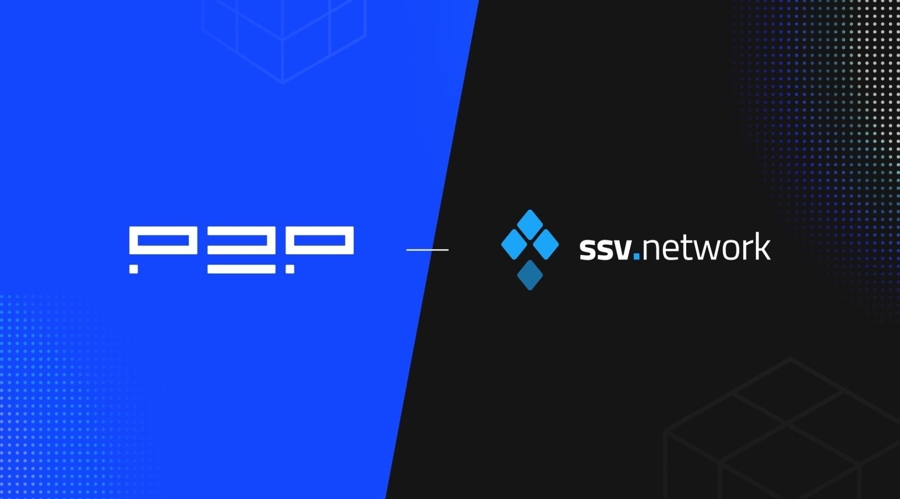
Non-custodial staking provider P2P.org puts another feather in its proverbial hat with its latest integration of Distributed Validator Technology (DVT) API. A creation of the SSV.Network, DVT is the next step towards a staking system that enhances security for large volume stakers.
With the partnership, P2P.org and SSV.Network are set to redefine what it means for institutions to stake without worries of bad actors affecting their vested assets.
Institutional Staking is a Headache
In blockchain networks that utilize PoS (Proof-of-Stake) protocols, finding the right validator is paramount. For large-scale firms that have a large volume of tokens and coins to delegate, it is ever more crucial. The key is not only to find reputable validators but at the same time ensure diversity.
Currently, even with reliable validators, it can be time-consuming to manually allocate portions of assets to ensure decentralization. Traditional allocation is done manually after validator review and can cost a significant chunk of money and time. This increases staking expenses and cuts down on potential yield.
Why the P2P.org and SSV.Network Partnership Matters?
The SSV.Network is known for its enhanced security in blockchain operations. Using advanced algorithms and encryption, including cross-chain compatibility. Distributed Validator Technology (DVT) is one of its offerings, allowing large-scale stakers to bypass current hurdles towards secure staking, saving time and money.
P2P.org is one of the largest non-custodial staking service in the world, spanning across 50 different networks. With the collaboration, it opens the doors for its institutional users to access DVT on the Ethereum network. Organizations can now enjoy all of the benefits, with none of the downsides of institutional-level staking.
Talking about collaboration and how its implementation will change large volume staking, CEO of P2P.org Alex Esin said,
“Distributed Validator Technologies are another step in mitigating staking risks, offering a robust framework for digital asset management and staking strategies,”…”The launch of the DVT Staking API marks a pivotal moment in our journey, embodying our commitment to providing secure, decentralized staking solutions to institutional clients.”
The partnership means institutions will now have access to the large pool of trusted validators on the Ethereum network, such as Stakely, HTX, and Allnodes. Using a single interface of the DVT API, asset management firms can now have distributed staking done in a fraction of the time required for manual selection and staking.
P2P.org Continues its Lead
P2P.org has defined how proper and secure staking has been done since 2018. The pioneers offer some of the most secure and high-yield node operators and continually add in more. P2P.org now offers its non-custodial services across 50 different networks for more than 60,000 delegators, who trust it with a combined $2.7 billion in assets.
The SSV DVT API integration allows its current and future users to leverage SSV’s experience and P2P.org’s reach to not only deploy assets easily and with minimum cost but also further the decentralization philosophy and boost the industry.
Non-custodial staking provider P2P.org puts another feather in its proverbial hat with its latest integration of Distributed Validator Technology (DVT) API. A creation of the SSV.Network, DVT is the next step towards a staking system that enhances security for large volume stakers.
With the partnership, P2P.org and SSV.Network are set to redefine what it means for institutions to stake without worries of bad actors affecting their vested assets.
Institutional Staking is a Headache
In blockchain networks that utilize PoS (Proof-of-Stake) protocols, finding the right validator is paramount. For large-scale firms that have a large volume of tokens and coins to delegate, it is ever more crucial. The key is not only to find reputable validators but at the same time ensure diversity.
Currently, even with reliable validators, it can be time-consuming to manually allocate portions of assets to ensure decentralization. Traditional allocation is done manually after validator review and can cost a significant chunk of money and time. This increases staking expenses and cuts down on potential yield.
Why the P2P.org and SSV.Network Partnership Matters?
The SSV.Network is known for its enhanced security in blockchain operations. Using advanced algorithms and encryption, including cross-chain compatibility. Distributed Validator Technology (DVT) is one of its offerings, allowing large-scale stakers to bypass current hurdles towards secure staking, saving time and money.
P2P.org is one of the largest non-custodial staking service in the world, spanning across 50 different networks. With the collaboration, it opens the doors for its institutional users to access DVT on the Ethereum network. Organizations can now enjoy all of the benefits, with none of the downsides of institutional-level staking.
Talking about collaboration and how its implementation will change large volume staking, CEO of P2P.org Alex Esin said,
“Distributed Validator Technologies are another step in mitigating staking risks, offering a robust framework for digital asset management and staking strategies,”…”The launch of the DVT Staking API marks a pivotal moment in our journey, embodying our commitment to providing secure, decentralized staking solutions to institutional clients.”
The partnership means institutions will now have access to the large pool of trusted validators on the Ethereum network, such as Stakely, HTX, and Allnodes. Using a single interface of the DVT API, asset management firms can now have distributed staking done in a fraction of the time required for manual selection and staking.
P2P.org Continues its Lead
P2P.org has defined how proper and secure staking has been done since 2018. The pioneers offer some of the most secure and high-yield node operators and continually add in more. P2P.org now offers its non-custodial services across 50 different networks for more than 60,000 delegators, who trust it with a combined $2.7 billion in assets.
The SSV DVT API integration allows its current and future users to leverage SSV’s experience and P2P.org’s reach to not only deploy assets easily and with minimum cost but also further the decentralization philosophy and boost the industry.
- SEO Powered Content & PR Distribution. Get Amplified Today.
- PlatoData.Network Vertical Generative Ai. Empower Yourself. Access Here.
- PlatoAiStream. Web3 Intelligence. Knowledge Amplified. Access Here.
- PlatoESG. Carbon, CleanTech, Energy, Environment, Solar, Waste Management. Access Here.
- PlatoHealth. Biotech and Clinical Trials Intelligence. Access Here.
- Source: https://www.financemagnates.com//thought-leadership/p2porg-now-offers-distributed-validator-technology-via-ssvnetwork-partnership/
- :has
- :is
- :not
- 000
- 2018
- 50
- 60
- 7
- a
- About
- access
- across
- actors
- add
- advanced
- affecting
- After
- alex
- algorithms
- All
- allocate
- allocation
- Allowing
- allows
- also
- and
- Another
- api
- ARE
- AS
- asset
- asset management
- Assets
- At
- Bad
- banner
- BE
- been
- benefits
- Billion
- blockchain
- Blockchain networks
- boost
- but
- CAN
- ceo
- change
- clients
- Coins
- collaboration
- combined
- commitment
- compatibility
- continually
- continues
- Cost
- creation
- Cross-Chain
- crucial
- Current
- cuts
- Decentralization
- decentralized
- defined
- deploy
- different
- digital
- Digital Asset
- Digital Asset Management
- distributed
- Diversity
- done
- doors
- down
- downsides
- easily
- encryption
- enhanced
- Enhances
- enjoy
- ensure
- ethereum
- ethereum network
- Even
- EVER
- expenses
- experience
- Find
- finding
- firms
- For
- fraction
- Framework
- further
- future
- hat
- Have
- How
- HTTPS
- Hurdles
- implementation
- in
- Including
- Increases
- industry
- Institutional
- institutional clients
- institutions
- integration
- Interface
- IT
- ITS
- journey
- jpg
- Key
- known
- large
- large-scale
- largest
- latest
- launch
- Leverage
- management
- manual
- manually
- Matters
- means
- minimum
- mitigating
- moment
- money
- more
- most
- network
- networks
- next
- node
- Node Operators
- non-custodial
- None
- now
- of
- offer
- offering
- Offerings
- Offers
- on
- ONE
- only
- opens
- Operations
- operators
- organizations
- our
- p2p
- Paramount
- Partnership
- philosophy
- pioneers
- pivotal
- plato
- Plato Data Intelligence
- PlatoData
- pool
- PoS
- potential
- Proof-of-Stake
- proper
- protocols
- provider
- providing
- Puts
- reach
- redefine
- reliable
- reputable
- required
- review
- right
- risks
- robust
- Said
- same
- saving
- secure
- security
- selection
- service
- Services
- set
- significant
- since
- single
- Solutions
- some
- spanning
- ssv
- stake
- stakers
- Staking
- Step
- strategies
- such
- system
- Technologies
- Technology
- than
- that
- The
- the world
- their
- this
- time
- time-consuming
- to
- Tokens
- towards
- traditional
- Trust
- trusted
- users
- using
- utilize
- Validator
- validators
- via
- volume
- What
- WHO
- will
- with
- without
- world
- Yield
- zephyrnet












